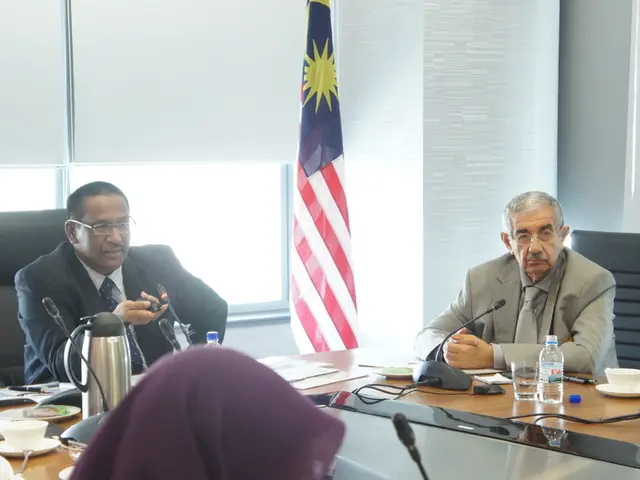Europe plans to impose restrictions on Israel in response to the severe humanitarian situation in Gaza and the West Bank
In a significant move, the European Union (EU) has put forward a package of sanctions against Israel, citing concerns over the ongoing military assault in Gaza and the deepening occupation of the West Bank. The proposed sanctions, which are yet to be voted on by EU member states, aim to alleviate the suffering in Gaza and pressure the Israeli government to change course.
The sanctions include measures against ten members of the Hamas terrorist organization and two Israeli ministers, Itamar Ben Gvir and Bezalel Smotrich, for inciting violence. The EU also plans to suspend trade concessions with Israel, a move that could result in Israel paying €227 million per year more in duties.
The EU's Foreign Policy chief, Kaja Kallas, has urged member states to work together to end the humanitarian crisis in Gaza. In a statement, Kallas emphasized that the aim is not to punish Israel but to address the deteriorating humanitarian situation. "Public opinion is shifting in member states, and people want to see the suffering in Gaza stop," Kallas said.
The EU's decision is based on the blockade of humanitarian aid, intensifying military operations, and the advancement of the Israeli settlement plan. Commissioner Maros Sefcovic stated that the EU saw "no alternative given the humanitarian situation in Gaza" and considered the proposal necessary and proportionate. Kallas also called for an "urgent ceasefire to stop the bloodshed" in Gaza.
The EU's proposed sanctions against Israel also target several settler organizations in the West Bank. This move has been met with criticism from the Israeli government, with Foreign Minister Gideon Saar accusing the EU of empowering Hamas and claiming the action under the EU-Israel Association Agreement was "replete with false accusations and legal flaws".
Interestingly, several EU member states, including Germany, the United Kingdom, Italy, and others, have opposed repeated sanction measures against Israel related to its Gaza conflict and occupation of the West Bank. They have instead focused on calls for peace negotiations and emphasizing humanitarian concerns. However, formal EU proposals for sanctions have been made and debated.
The decision is significant as the EU is Israel's largest trading partner, accounting for 32% of Israel's total trade in goods with the world in 2024. If either of the two largest countries - Italy or Germany - support the plan, then it'll pass. However, both governments have been steadfast in their opposition to taking any action in response to Israel's actions in Gaza and the West Bank.
In response to the terrorist attack in Kibbutz communities on 7 October 2023, Commissioner Sefcovic visited Israel to share his shock and horror over the Hamas terror attack. The EU's actions underscore a growing international concern over the ongoing conflict and the need for a peaceful resolution.
Read also:
- United States tariffs pose a threat to India, necessitating the recruitment of adept negotiators or strategists, similar to those who had influenced Trump's decisions.
- Weekly happenings in the German Federal Parliament (Bundestag)
- Southwest region's most popular posts, accompanied by an inquiry:
- Discussion between Putin and Trump in Alaska could potentially overshadow Ukraine's concerns







